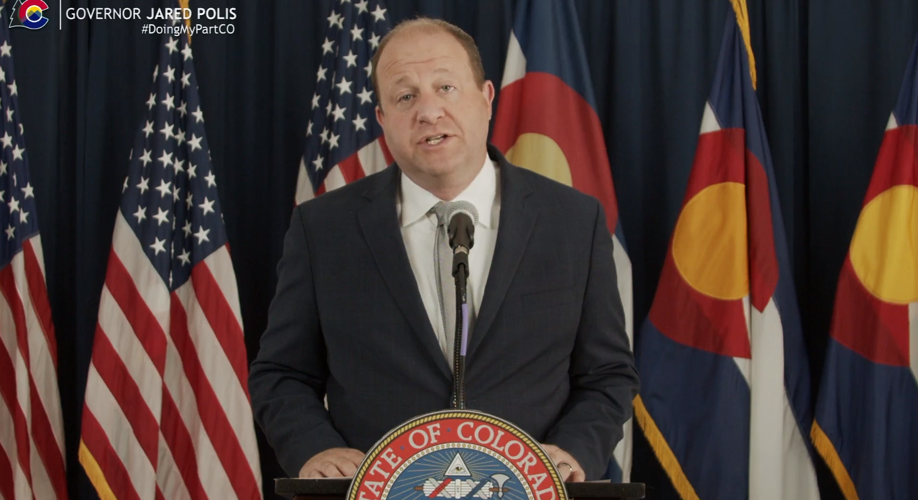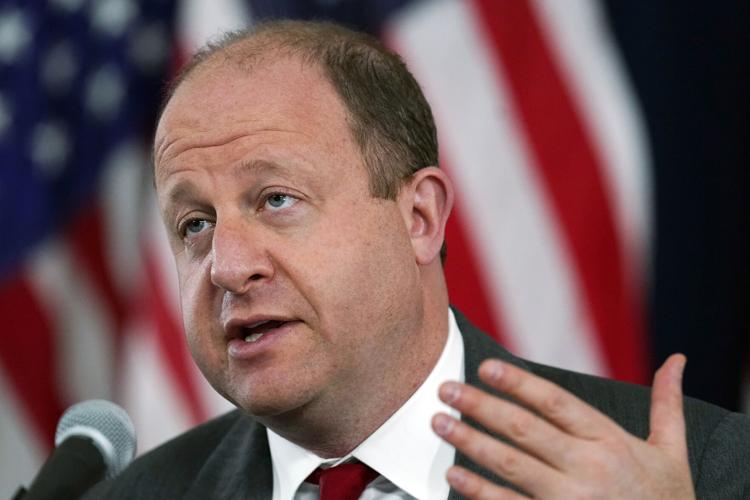

Gov. Jared Polis discusses the state’s relaxing of the mask mandate in alignment with guidelines from the Centers for Disease Control and Prevention on May 14, 2021.


Gov. Jared Polis speaks during a news conference March 16 in Denver.
The Colorado General Assembly ended its 2021 session last week, one day before Gov. Jared Polis sat down with The Gazette’s editorial board for a wide-ranging discussion about key issues lawmakers took up, and some they didn’t get to.
The Gazette’s editorial board and others have criticized the legislature’s massive spending, fee, and tax increases. House Bills 1311 and 1312 would roll back nearly $350 million in tax exemptions for businesses and the wealthy. Senate Bill 260 raises the gas tax without voter consent by calling it a “fee” to fund transportation (The Gazette gave it a qualified endorsement).
Polis began the discussion with an introductory explanation of efforts by him and the legislature to save money for average Coloradans. He spoke of Senate Bill 123, which positions Colorado to negotiate prices for pharmaceuticals from foreign countries in addition to Canada. He applauded the legislature for passing a state child tax credit, which will net a tax savings of $540 a year for each child in a household that earns up to $48,000 a year. The legislature expanded the earned income tax credit, which Polis applauds as an incentive to work. Another bill allows those 65 and older to fully deduct their Social Security income. Another lowers the residential tax assessment rate from 7.15% to 6.96%. Polis spoke of tax relief for restaurants, which will keep the 2.9% sales taxes they collect this summer. Small businesses with less than $50,000 worth of personal property no longer must file for and pay business personal property taxes.
Our Q&A began with a question about the unsuccessful Senate Bill 200 and the bill the replaced it, the recently passed House Bill 1266. Each was written to address “environmental justice.”
You were not happy with SB 200 and told us a while back you were prepared to veto it. The legislature passed 1266, which incorporates some of SB 200. How do you feel about what came out of the sausage factory?
There were two pieces to SB 200, one of which we had great concern with and one with which we were fine. The part we were fine with was a focus on environmental justice and resources at the Colorado Department of Health and Environment (CDPHE) to do environmental justice work. Not a major policy change, but more just some resources from pre-existing fines that would go to staffing up a position at CDPHE that would look at the disproportionate impact of pollution. We’ve always been fine with that. … The part we weren’t accepting was saying this one board, the Air Quality Control Commission (AQCC), would have authority across the entire economy to control emissions. Across transportation, across utilities, across buildings. What the compromise wound up doing is ensuring some things we’re already doing, that were already in rulemaking, and that we’re comfortable with, are put in statute. It’s basically emissions for industrial sites, and there are a hundred and some — they already knew it was coming, they already are generally with the program. It just means the rulemaking we were already doing has some statutory parameters. The second was a very slight change, and it affects the six major utilities that are already in the pipeline with their energy plans. It basically says they have to do what they were doing anyway. What got taken out was everything around transportation, everything around buildings, everything around economy-wide caps that we worried could open the door to a cap-and-trade system that we’re not supportive of. So, in many ways, it confirms and put into statute some of the work we are doing in discreet areas, and then it had all the environmental justice work which we are thrilled to have the capacity to do.
It’s about a 60% reduction in emissions by 2030. That was in our greenhouse gas roadmap, the industry knows this. It’s not a different number or a different plan than had ever been talked about with them. And technology is absolutely there to drive this. They’re already doing it. Whether it’s recapturing emissions, whether it’s being able to sell emissions from Font Range properties rather than burning it off. All that stuff is happening.
But, rather than PUC being the center of this, they (SB 200 sponsors) were trying to say the AQCC should basically tell the utilities what to do. We said no to that, we said it is PUC. Of course, we want to work on clean energy plans. The PUC values clean energy. They also value low rates for customers; they value the reliability of the grid, they value all of those things at the PUC. The AQCC has a myopic approach, just by nature of what they do. They don’t look at rates for consumers. They don’t look at reliability. Their only charge is emissions, so they’re not the right place to look at utilities.
Let’s talk about Senate Bill 260, the transportation bill. Is this bill everything you wanted? Where does it fall short? House Speaker Alex Garnett said this was the highlight of the legislative session. Do you agree?
I do agree with that. If you look at what the impact on Colorado will be in five years, in 10 years, in 15 years, absolutely. The failure to address our crumbling infrastructure, our roads, our packed highways. It would not only hurt our quality of life, but it would hurt our economic productivity and our ability to attract business. And you see that in Colorado Springs. You see that in The Gap. You see that in access roads. It’s a transformational impact for our state. It’s a great product. It’s one we can be proud of. It’s not what any single group wants and that’s usually what you want to come out of a political process. You want to have a give and take.
About 78% of the money goes to roads, bridges, hard infrastructure. The rest, which was part of the agreement, goes to electric vehicle infrastructure, cleaner air, and other things, but this is fundamentally a roads and infrastructure bill with the lens on air quality, which is appropriate because people care about air quality. We want cleaner air as we build out our transportation infrastructure. I wanted to see as part of this bill some savings for people right up front, right now. That meant either reducing the gas tax or reducing the vehicle registration fee. So, I was pleased to see that every Coloradan will save $11 per vehicle next year with this. And that’s before any of the inflation indexes on gas fees even go in. So, if you have three cars, you’ll save $35 bucks with this bill. I was glad to see the savings upfront especially coming out of the pandemic. It’s not a bill any one person wrote. It’s the result of collaboration. The business community, the environmental community, motor carriers, local governments, mayors of cities and counties all came together around a solution that fundamentally works for Colorado.
The Legislature passed House Bill 1317 to address concerns about children using high-potency “medical” marijuana. How do you feel about this bill? What would you change? Does it go far enough?
I would say there’s a real problem with underage, unauthorized use of marijuana. I think part of what the sponsors wanted to do is respond to 18-year-olds buying marijuana and selling it to their high school classmates. I fundamentally believe, and I think (The Gazette editorial board and I) disagree on this, I think adults should have the legal right to use marijuana as alcohol, and the voters of Colorado agreed. But absolutely, I’m concerned with underage use and kids having access, and I think that’s what led to this bill.
Senate Bill 256 would allow local governments — to include special districts, such as water and fire districts — to regulate guns. Is this practical. Is it even legal, given recent Second Amendment jurisprudence out of Chicago and D.C.? This seems like something that would be very impractical to enforce and possibly illegal to enforce.
I can tell you our process includes a legal analysis that goes to me with every bill. It includes a fiscal analysis, a legal analysis, a policy analysis. I look at that for every bill in making my decision. I will talk generally about the concept of local control. I do think that like so many things in Colorado we have different areas of our state with different relationships with gun ownership, with the different cultures, and I think it’s completely appropriate that we empower local jurisdictions to draw the line. I think that’s what can prevent overarching state regulations in many areas where gun ownership is an important part of culture and gun owners would find state restrictions onerous. We can help provide a way that areas that want to put more effort into gun safety are also able to feel part of our diverse state of Colorado.
You said you don’t want to be asked about vetoes, but this might be one possibility for a veto would you say?
No, I’m not saying anything.
We know you didn’t say “veto.” But we’re asking.
I think at the 20,000-foot level I’m expressing support for empowering people to have an appropriate approach to the relationship between gun ownership and safety in their area, and that is a real Colorado solution. I don’t think residents of El Paso County want to live under the exact same gun regulatory regime as residents of Boulder County. And if we can find a way to allow folks to strike that right balance for their communities that could be a good thing.
EDITOR’S NOTE: The U.S. Supreme Court’s 2008 ruling in District of Columbia v. Heller says the Second Amendment protects an individual’s right to keep and bear arms, overturning the District’s handgun ban. The court’s 2010 ruling in McDonald v. Chicago reaffirmed the ruling in Heller and made clear the Second Amendment can be enforced against local and state governments that try to interfere with Second Amendment rights. The Colorado Constitution says “The right of no person to keep and bear arms in defense of his home, person and property, or in aid of the civil power when thereto legally summoned, shall be called in question … ” A May 14 Gazette editorial encourages Polis to veto Senate Bill 256 to avoid a law that conflicts with civil rights protected by the state and federal constitutions and the U.S. Supreme Court.
In a lot of other states critical race theory was or is part of the legislative session this year. More states are banning the teaching of critical race theory teaching in schools. There is a lot of concern being raised, particularly on the right but a lot in the center, about critical race theory being taught in schools. Is this of concern to you?